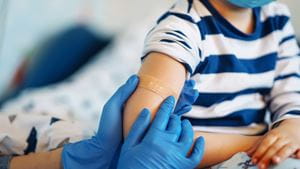
More than 18 months after the first COVID-19 vaccines were administered to adults in the United States, the FDA and CDC announced children ages 6 months through 4 years will be able to receive smaller-sized doses of the vaccines, as well.
Pediatric doses for both the Pfizer-BioNTech and Moderna COVID-19 vaccines were authorized under emergency use authorization (EUA) by the CDC. This will allow approximately 18 million children living in the U.S. to receive some form of protection against the virus.
Currently, Rochester Regional Health is offering only the Pfizer-BioNTech COVID-19 vaccine for the 6 months through 4 years age group.
Steven Schulz, MD, is the Rochester Regional Health Primary Care and Ambulatory Specialty Institute Pediatric Medical Director for Monroe County and Finger Lakes Medical Associates. He explains the approval process for these vaccines, how to know if they are safe, and where to find them.
While both pediatric COVID-19 vaccines are mRNA vaccines, they are slightly different in the way they are administered.
The Pfizer-BioNTech COVID-19 vaccine is three 3-microgram doses for this young age group. The first two doses are administered three weeks apart, followed by the third dose two months after the second dose. Data published from clinical trials shows the pediatric vaccine is approximately 80 percent effective at preventing infection. However, studies are ongoing and this number may change.
The Moderna COVID-19 vaccine is two 25-microgram doses for children ages 6 months through 6 years. The second dose is administered four weeks after the first dose. Clinical trial data shows the Moderna vaccine ranges from 37.5 percent effectiveness at preventing infection in kids at the older end of this age range to 51 percent in children under 2.
The vaccines will be provided at no cost to children and their families.
“We are excited to provide protection to the youngest children who have not yet received protection from COVID-19,” Dr. Schulz said. “Unfortunately, more than 40,000 children have been hospitalized and approximately 200 children ages 5 and younger have died of COVID-19 since the start of the pandemic.”
Similar to other childhood vaccinations, there are relatively few side effects from the pediatric COVID-19 vaccine doses.
Some children who took part in the study experienced:
Receiving the vaccine provides the best level of protection against COVID-19 – even if a child experiences some of these side effects, Dr. Schulz said.
“This is an effective way to help protect against children getting COVID-19,” Dr. Schulz said. “This also provides an extra level of protection for children in daycares and preschools who will now be less likely to be sickened by this virus.”
The process to review the safety of COVID-19 vaccines for pediatric patients is similar to other vaccine safety reviews.
Both Pfizer and Moderna conducted multi-stage clinical trials that enrolled volunteers. After several months of collecting data and compiling it, researchers submitted the data to the FDA. A panel of experts rigorously reviewed the data compiled by the FDA and met to discuss it.
Upon review, the FDA panel determined they needed more data. The group asked Pfizer to conduct more research and report back so they could make a better informed decision that was safe for the affected age group.
After Pfizer provided more data and Moderna submitted its application for EUA, the panel voted to approve the vaccines for EUA and the FDA gave its approval, as well.
This was followed by a CDC panel of experts conducting a similar review, discussion, and voting process. CDC Director Dr. Rochelle Walensky made the final recommendation to endorse use of the vaccine for EUA for children ages 6 months through 4 years.
Young children can receive the pediatric COVID-19 vaccine at the same time as other vaccinations. Children’s immune systems are capable of adjusting to them.
“If you have any questions about anything related to the COVID-19 vaccines for your children, ask your pediatrician,” Dr. Schulz said. “The first concern for child healthcare providers is the safety and wellbeing of your child. They will give you the best answers they know based on their experience and extensive training.”
The federal government has authorized 10 million pediatric doses of the COVID-19 vaccine to be distributed – split equally between Pfizer-BioNTech and Moderna.
Starting the week of June 27, Rochester Regional Health will have doses of the Pfizer-BioNTech vaccine for children ages 6 months through 4 years in all our Pediatric offices. Patients can now contact their provider to schedule a vaccine appointment.
Parents can also search online for pharmacies, community health centers, and other locations offering doses of the vaccines for young children. These can be using the search tool at Vaccines.gov.